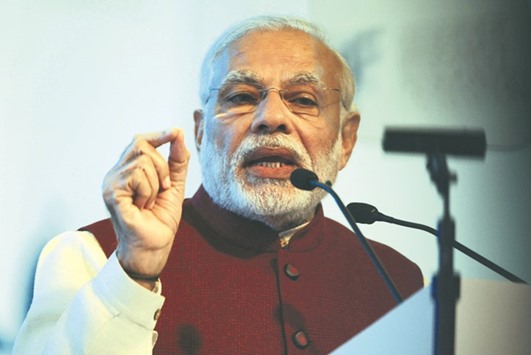Growing military ambitions in the Asia-Pacific are creating security risks, Prime Minister Narendra Modi said yesterday in a coded message to China to exercise strategic restraint.
Although couched in diplomatic language and not mentioning China by name, Modi’s remarks in a keynote foreign policy speech aligned New Delhi with US President-elect Donald Trump’s intent to curb Beijing’s regional clout.
“Rising ambition and rivalries are generally visible stress points,” Modi told an audience of politicians and top military brass from 65 nations at a security conference in New Delhi.
“The steady increase in military power, resources and wealth in the Asia-Pacific has raised the stakes of security.”
The US Republican has, since his shock election victory in November over Democrat Hillary Clinton, called into question the “One China” policy that Washington has adhered to for decades.
His pick for secretary of state, former ExxonMobil CEO Rex Tillerson, also told a confirmation hearing that Beijing’s militarisation of reclaimed islands in the disputed waters of the South China Sea must be stopped.
That is music to the ears of the foreign policy establishment in New Delhi, as are Trump’s tentative – albeit in Washington controversial – overtures towards Russia’s President Vladimir Putin, whom Modi yesterday called “an abiding friend”.
Modi was addressing the second annual Raisina Dialogue, a geopolitical gathering in New Delhi sponsored by India’s foreign ministry and the Observer Research Foundation, a think tank, that is competing for attention with the higher-profile World Economic Forum in Davos, Switzerland.
Speaking in Davos, Chinese President Xi Jinping avoided mention of Trump and instead mounted a vigorous defence of free trade that the American president-elect has vowed to roll back to protect US jobs.
Although many of the guests in New Delhi were former, rather than current prime ministers, they did include the top US naval commander in the Pacific, Admiral Harry Harris.
Modi called for a rules-based security architecture in the Asia-Pacific that is “open, transparent, balanced and inclusive, and promote(s) dialogue and predictable behaviour rooted in international norms and respect for sovereignty.”

Prime Minister Narendra Modi speaks at the inaugural event of the three-day Raisina Dialogue conference in New Delhi yesterday.
